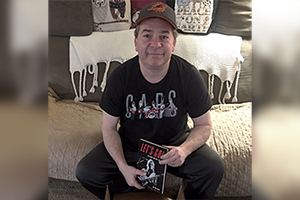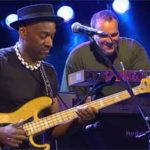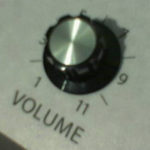“Let’s Go” author Joe Milliken describes his bio of Cars bassist
Exclusive interview with FBPO’s Jon Liebman
December 30, 2019
Joe Milliken is a journalist and author, based in Vermont. After two decades of writing freelance articles, mostly for local, New England-based publications, Joe has published his first biography, Let’s Go, about Cars bassist Benjamin Orr.
FBPO: What made you decide to write a biography?
JM: Well, I’ve been a published writer for about twenty years, but up until doing this book, it was all local newspapers and magazines. I write about a lot of different things. I have a couple local papers here in southern Vermont that I write community-related stuff for, and I also write for a couple music publications, most notably Goldmine magazine, which is a music collectors’ kind of publication. I consider myself a music journalist, first and foremost. I’m not a musician, I couldn’t carry a tune if it had a handle on it, but I love music. It’s my passion, so I write about it. That’s my way of being involved in music. I was writing for newspapers and magazines for about twenty years or so, and then at one point I decided I wanted to try writing a book. I had a short list of ideas, all music-related. I just didn’t know what the specific subject was going to be.
FBPO: What inspired you to make Ben Orr the subject of your book?
JM: I had a few ideas that I was mulling around, just kind of taking my time trying to figure it out. And then one day I got a phone call, out of the blue, from a Cars fan. And this tells you how far it goes back. She saw my MySpace profile page. On my profile I said that I was a music journalist, that I was from Boston, and I listened to the Cars, one of my favorite bands. And she said I think you should write a book about Ben Orr of the Cars. I thought to myself, well, the Cars are one of my favorite bands, but, admittedly, they weren’t on my short list of ideas. I also thought, why wouldn’t I just write a book about the Cars? Why would I write specifically about Ben? And if I was going to write about an individual in the band, why wouldn’t it be Ric Ocasek, the front man and leader and main lyricist of the band? So she said, I think you should investigate him anyway and see what you think. So that’s what I did. I took a little time and researched Ben, and I started finding out all these cool things about him, most notably that he was originally from Cleveland, home of the Rock & Roll Hall of Fame, so I thought that was really cool in itself. And then I found out these other things about him, as you read in the book, that he was a teen star, and here’s this 17-year-old kid whose band is the house band on this Upbeat show that I had never heard of. This girl that had given me the idea had a couple of names for me of people who knew him, so I contacted these people and started talking to them. They ended up in the book, telling me how he quit school when he was a sophomore in high school, being a musician is the only thing he ever wanted to do, and those types of things. And that is really what hooked me to write this book about Ben. It was great that he was famous in the Cars, but what hooked me was all these things he did early in his life. It wasn’t even anything to do with the Cars. I’m like, I gotta tell this guy’s story.
FBPO: You spent a lot of time writing Let’s Go. Tell me a little more about your research.
JM: I’ve done a bunch of interviews, and when I tell people I interviewed that I literally took a decade to write this book, some of them can’t even believe it. I was already a writer (with) a full-time job and a family. I was kind of writing it on the side, in my spare time. There were a couple times along the way where, due to life circumstances, I might have had to put it aside for a little while, but I essentially took a decade to put this thing together. Ben passed away in 2000, a few years before I even started this project. Obviously, I couldn’t interview the man himself, so what’s the next best thing? You find as many people as you can who knew Ben so they can be his voice and tell his story. So that’s what I did. I had a short list of maybe a dozen people throughout his life, some people from Cleveland, a few people that knew him in Boston once (the Cars) became famous, and I started interviewing these people. I had no idea how many people a rock star can know. It’s just unbelievable! Almost everybody I talked to gave me another person, or a couple of people to talk to. It just went on and on and on. I ended up interviewing over 120 people who knew Ben. I could have kept going, I could still be interviewing people who knew Ben. Eventually, I cut it off. When I felt like I had painted a good picture of his story, I eventually stopped. After a decade. [Laughs]
FBPO: The way you describe Ben in the book makes it seem like there was a certain aura about him that made him really special. Did you find that?
JM: Oh my God, yes. You can talk to somebody who knew him in junior high school, and they would say the same kinds of things about him as somebody who knew him at the end of his life. It was these common threads that people would say about him, how loyal he was, and how generous he was, and how down to earth he was, and, like you just mentioned, a lot of people felt like he just had this aura about him. Ben could walk in a room, and you might not even know who he is. You wouldn’t know that he was a rock star, but he still drew attention from people. He would enter a room and heads would turn. I’ve interviewed guys that would be walking through airports with him and, like, heads would just turn. “Who is that guy? I mean that’s somebody.” So yeah, he really did have this aura about him, whether somebody knew he was a rock star or not. Pretty amazing.
FBPO: Ben was not only a bassist, but also a vocalist and a multi-instrumentalist. Do you think any of his musical abilities may have been underappreciated?
JM: I think so, I really do. He’s, obviously, mostly known as a bass player and a vocalist in the Cars, but what a lot of people don’t know about him is that he could play almost anything. He first got into music when he was 10 years old. He started out as a drummer. His parents paid so he could take drum lessons. (In) the first band he was ever in, at the age of 12, a band called the Cyclones, he was the drummer. And then a few years later, when he auditioned for the Grasshoppers, which would end up being the band that was on the Upbeat show, he took over for the leader of that band as a rhythm guitarist and a singer. Eventually, when he got to the Cars, they needed a bass player, and he started playing bass. He could adapt his abilities to whatever band he was in at the time needed. After the Cars broke up and he did his solo Orr band, he went back to guitar. He played acoustic guitar and he played a Les Paul, so yeah, he really was a multi-instrumentalist and, of course, you know, his vocals. To me, his vocal style is right up there with David Bowie, Paul McCartney, Paul Rodgers from Bad Company… There were a lot of Cars fans that reached out to me after this book came out, saying that they didn’t realize that he played all these other instruments and was actually a drummer and a guitar player before he ever became a bass player in the Cars.
FBPO: I didn’t know that either till I read your book!
JM: That’s great. I’m glad I could help spread the word about Ben. It’s really important to me.
FBPO: What can you tell me about his bass gear? What did he play?
JM: He actually owned a lot of different basses along. A few of his early instruments, basses, he lost in a fire. Once the Cars had signed their record deal and were starting to get big, he lived in a suburb of Boston. He had a condo in an apartment building, and that apartment building was gutted out by a fire. He lost all of his instruments and basically had to start over, as far as his equipment goes. My favorite guitar of Ben’s was a Vox “Constellation” bass. It was a teardrop. Beautiful guitar! And that’s one of the ones that he lost in the fire.
FBPO: Is that the one on the cover of the book?
JM: Yes it is, as a matter of fact! The cover photo is a beautiful photo by a famous rock photographer Ebet Roberts. She’s based in New York City. She actually toured with the Cars a couple of times and kind of was their photographer for a while. And that is, literally, my favorite photo of Ben. I just love it so much. I love how half of his face is in shadow in that photo, and it just so happened that he’s playing the Vox, my favorite bass of his. So there were a couple of reasons why I chose that as the cover photo.
FBPO: What other basses did he play?
JM: In the late ‘70s, from like ’77 through ’79, when the Cars were first getting their record deal and were starting to become huge, he played an Ibanez Rocket Roll Flying V. He played a Rickenbacker, but his two main basses, or at least the ones that I see mostly in photos of him onstage during that time, (were) a Music Man Sting Ray, and the Vox Constellation that I told you about. In the ‘80s, he played a Fender Precision, a Gibson EB-2, and a Gibson EB-6. A Steinberger L2 was another bass that he played. Like I said, he was a guitar player before he ever became a bass player, so in his early days, he played a Fender Jazzmaster guitar, a Fender Telecaster, (and) a Gibson SG Junior. In the late ‘80s/early ‘90s, he played a Fender Strat, (and) he played a Guild Blade Runner guitar. Those are a few of the guitars and instruments he played along the way.
FBPO: What kind of place do you think the Cars will hold in rock music history, particularly in light of their 2018 induction into the Rock & Roll Hall of Fame?
JM: It’s kind of hard to justify me saying that they were an underrated band because, “Well, Joe, how can a band be underrated if they’re in the Rock & Roll Hall of Fame and they sold over 30 million albums?” But I say that because sometimes I don’t think your average rock fan realizes how much influence they had. They essentially were only a band for about ten years. Their first album came out in ’77 or ’78, and their last album was 1987. So it’s not like they have some thirty-year history of making albums. I think because of that people might not realize the type of influence that they had in such a short period of time. I really don’t think you can pigeonhole them. They’ve been called a classic rock band, they’ve been called a pop band, they’ve been called a new wave band. They actually even had like a punk label at some point. I think they’re a combination of all of those things. They played classic rock, they played some hard rock, they had top-10 hits, so they were played on pop radio, they were considered one of the leaders of the new wave outfit when new wave kind of hit in the early ‘80s. If you hear a Cars song come on the radio, you know it’s them right away, no matter what kind of style they’re playing. You can turn on the TV today and see commercials that have Cars songs in the background. I’m a sports fan. I watch Monday Night Football and they’ll be segueing into a commercial and I’ll hear a Cars song. I really think that they had a major imprint and influence on pop culture in general.
FBPO: How do you think Ben should be remembered?
JM: If you see photos or video clips of Ben on the stage with the Cars, he was sort of the heartthrob of the band. (But) Ben used to flip a switch to go onstage and be a rock star and entertain people. When he came offstage, he flipped that switch off, and he was just a regular guy. After the Cars broke up, he moved to Vermont. He was actually a hunter and a fisherman, and liked to go out in the woods. You see this guy onstage, and the last thing you would think is some down-to-earth hunter and fisherman kind of guy, drivin’ around in a pickup truck. But that’s how he was. He avoided the spotlight. If you see interviews of the Cars in their heyday, he kind of sat in the background and didn’t really say too much because that’s the way he was. Obviously, if an interviewer would ask him a question, he would respond, but he kind of stayed in the background and out of the spotlight for the most part. So, I want people to recognize that he was also a very loyal and generous man. I interviewed a few people in the book who were friends with him and were in bands with him in his early days, long before he became famous, and they tell me stories that after the Cars became famous, when they were getting ready to come to Cleveland to do a show, he would call up his friends that he went to school with and was in bands with when he was young. He would get them concert tickets, backstage passes, limo rides to and from their house, never let them spend a dime. He always remembered where he came from. He was just a guy that never forgot his roots and never forgot where he came from, and he didn’t let stardom affect him in that way. And that’s something that I want people to know. Even though you see this glamorous rock star who was a millionaire, it didn’t change the way he was as a person. I think that’s really important for people to know, and that’s how I want people to perceive him, not as a rock star, but as a guy who just never forgot where he came from. I think that’s a really important message that I (tried) to get across in the book, and I hope I was able to do that.
FBPO: Music seems to be just one of several of your passions. You’ve also written about everything from business and sports to specialty foods and, as you mentioned, local community news. What’s keeping you busy now and what’s next for you? Are you going to write any more books?
JM: I do plan on writing another book. I told myself when the book came out that I was going to take a year to reset myself. I have not decided exactly what it is yet, other than I know it’s going to be music-related. I will tell you, this one’s not gonna take me a decade! [Laughs]
FBPO: How much has the experience of writing Let’s Go inspired you to learn bass?
JM: I’m not, technically, a musician. That’s why I write about music. It’s my way of being involved in music. I do own a bass and I do kind of mess around with it, but not enough to be in a band or anything. Just me kinda messin’ around.
Let’s Go is available here.
See Jon’s blog, with key takeaways from this interview, here.






Great interview Joe.And you said it all so well.Enjoyed itThnx
Benjamin Orr was an incredible singer, his voice is very distinctive very beautiful. He could sing anything and not miss a beat, his vocal range was truly amazing. He was a great musician and a lovely, humble modest man who loved his family and his friends. He never forgot where he came from or his roots. Kind to a fault. Up there with the best of them. Great book.
Great little article on Ben Orr. People don’t really realize that he sang lead on lots of famous Cars songs. Moving in stereo for example. What a performer. Very underrated in my opinion.
Agreed. Glad you liked the interview. Thanks, Dylan!